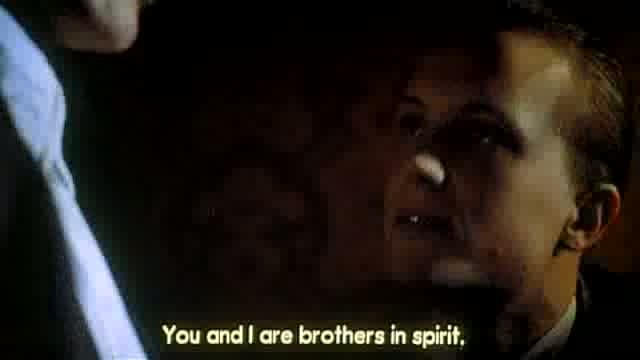Réalisation:
Volker SchlöndorffPhotographie:
Tomas ErhartMusique:
Alfred SchnittkeActeurs·trices:
Ulrich Matthes, August Diehl, Hilmar Thate, Bibiana Beglau, Ivan Jiřík, Adolf Filip, Zdeněk Pecháček, Karel Dobrý, Vladimír Fišer, Petr Janiš (plus)Résumés(1)
Obtenir une « permission » pour quitter ponctuellement un camp de concentration, voilà qui est exceptionnel. C’est pourtant la proposition incroyable qui est faite à l’abbé luxembourgeois Kremer. Il va pouvoir échapper pour une brève période à cet univers dont Dieu est absent. Arrivé à Luxembourg, Henri est tenu de se présenter quotidiennement au siège de la Gestapo. Il y rencontre Gebhardt, un jeune officier nazi, passionné et avide de pouvoir. Si au début leurs rapports sont clairement définis, la situation évolue au fil des neuf journées. Ces deux hommes que tout sépare – sauf peut-être leur foi en Dieu – se livrent en permanence à des débats d’idées et des joutes oratoires. Jusqu’au moment ou Kremer s’avise qu’il ne peut compter que sur lui-même et que c’est à lui seul de décider. Question de vie ou de mort. Au moment crucial, Kremer saura faire le choix qui s’impose. (ARTE Éditions)
(plus)Critiques (2)
A lot of raw story of a Luxembourgish priest in a concentration camp and also outside of it. I liked that the film did not hold back and delved into philosophical questions about faith from top to bottom. Different people, different opinions, often quite strong opinions during war, made me think about the whole film for a long time after it ended. Ulrich Matthes played absolutely precisely and I must admit that I believed him, even the fear in his eyes that he emitted every other scene. If I were in the place of the person whose story this film tells, I would probably collapse during those nine days of torture. In any case, the film has a great wartime atmosphere and it all unfolds superbly. I'm surprised that more people don't know about this film, considering that our country was also involved in its production.
()
I've seen quite a few films about Nazis and extermination camps, but this one is special. The sad story of Abbé Henry Kremer shows the atrocities of the Second World War from the perspective of the Church. Dealing with philosophical questions of faith, conscience, and betrayal, Ulrich Matthes was undoubtedly a good choice for the role of a man who does not succumb to pressure and keeps his composure even when he is realistically threatened with death. The character of the young Gestapo officer Gebhardt is certainly intriguing, with his non-black-and-white nature, portrayed excellently by August Diehl. I cannot forget about the Czech mark left on the film by Karel Dobrý. In the small space of the commander of the Dachau concentration camp, he was so strongly etched in my memory that at times I felt as if he had perhaps been born an SS man. The Ninth Day is not a pleasant film to watch, but it will make you think about how you would act in a given situation. (80%)
()

